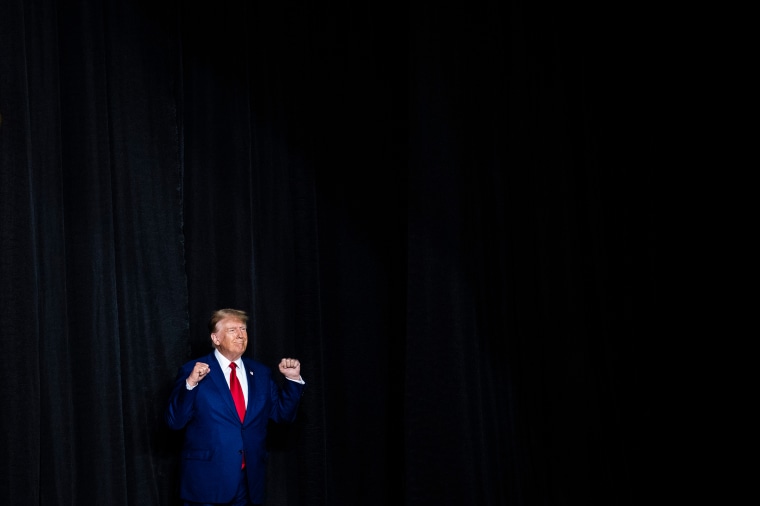WASHINGTON — The Supreme Court on Friday agreed to consider whether former President Donald Trump could be deemed ineligible to run for federal office again because of his actions leading up to the Jan. 6 attack on the Capitol — a case that could have a seismic impact on the presidential election.
The justices will review a decision by the Colorado Supreme Court that said Trump could be barred from the Republican primary ballot in that state, but the U.S. Supreme Court ruling is likely to have national repercussions, potentially setting guidelines that would determine how every other state would handle the issue.
The brief order said the case would be argued on an accelerated schedule on Feb. 8, indicating that a ruling will follow soon after.
One other state, Maine, has issued a similar decision saying that Trump cannot appear on the ballot. Like the Colorado ruling, the Maine decision is on hold while litigation continues. Trump remains on the ballot in both states.
“We’re glad that the Supreme Court will definitively decide whether Donald Trump can be on the ballot. We look forward to presenting our case and ensuring the constitution is upheld," the government watchdog group Citizens for Responsibility and Ethics in Washington, which represents the six plaintiffs who sued, said in a statement.

Colorado Secretary of State Jena Griswold, a Democrat, said in a statement that the American people "deserve clarity on whether someone who engaged in insurrection may run for the country's highest office." The court, she said, should "prioritize this case and issue a ruling as soon as possible."
If the Supreme Court rules for Trump, then he would stay on the ballot. But should the court uphold the Colorado ruling, then other states could be encouraged to follow suit.
There is also the possibility that if Trump is kicked off the ballot, Republicans could take retaliatory action by doing the same to President Joe Biden. Texas Lt. Gov. Dan Patrick has already floated such a move.
The Colorado Supreme Court ruled on Dec. 19 that Trump was ineligible to appear on the Republican primary ballot in the state, although it put the ruling on hold to allow for appeals of its decision. In the meantime, Maine’s top election official reached a similar conclusion, further heightening the stakes. Unless the Supreme Court acts quickly, any decision could have limited impact during the primaries, but the logic would likely apply to the general election as well.
After the U.S. Supreme Court issued its order Friday, Trump praised the three justices he nominated to the Supreme Court: Justices Amy Coney Barrett, Neil Gorsuch and Brett Kavanaugh.
“I fought really hard to get three very, very good people, and they’re great people, very smart people, and I just hope that they’re going to be fair,” Trump said at a campaign rally in Iowa.
Earlier, the Trump campaign said it was "confident" that the court would "unanimously affirm the civil rights of President Trump."
"We welcome a fair hearing at the Supreme Court to argue against the bad-faith, election-interfering, voter-suppressing, Democrat-backed and Biden-led, 14th Amendment abusing decision to remove President Trump’s name from the 2024 ballot in the state of Colorado," spokesperson Steven Cheung said in a statement Friday.
The Colorado Supreme Court based its ruling on language in the Constitution’s 14th Amendment that prohibits those who “engaged in insurrection” from running for various federal offices. Among the novel legal questions presented by the case are whether the language applies to candidates for president and who gets to decide whether someone engaged in an insurrection.
The state high court’s decision reversed a lower court’s ruling in which a judge said Trump had engaged in insurrection by inciting the Jan. 6 riot but that presidents are not subject to the insurrection clause of the 14th Amendment because they are not an “officer of the United States.”
Trump and his allies have raised that point as well as other arguments that the 14th Amendment cannot be applied.
Republicans, including Trump's primary opponents, broadly support his claim that any attempt to kick him off the ballot is a form of partisan election interference. Some Democrats including California Gov. Gavin Newsom have also expressed unease about the 14th Amendment provision being used as a partisan weapon.
The plaintiffs, as well as Colorado Secretary of State Jena Griswold, agreed with Trump and the Republican Party that the Supreme Court needed to take up the case. They asked for a quick ruling ahead of primary season.
In Colorado, the deadline for candidates being certified for the primary ballot was Friday. Colorado is one of more than a dozen states that has its primary election on March 5.
